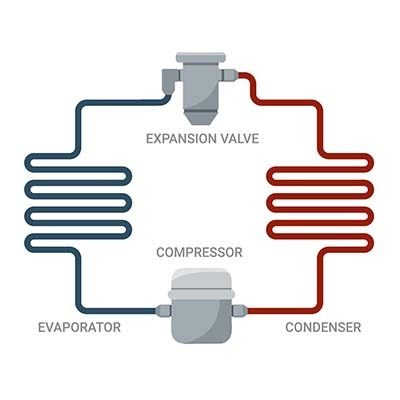Have you been told by a heating, ventilation and cooling (HVAC) technician that your home’s AC unit has a bad expansion valve?
AC Units are comprised of many different parts. While you’re probably familiar with the condenser and evaporator coils – the two large units found outside and inside your home, respectively – the expansion valve often goes unnoticed because of its small size and discreet location.
Nonetheless, a broken or faulty expansion valve can have serious consequences on the performance of your AC unit.
Overview of AC Expansion Valves
The expansion valve, also known as a thermostatic expansion valve (TEV), is an AC component that’s designed to regulate the flow of refrigerant by removing pressure from it.
All modern-day AC units contain refrigerant. It’s used to collect heat from inside your home so that the heat can be released outside your home, thereby creating a cooler living environment. As refrigerant heats up, however, it becomes pressurized.
The expansion valve works to relieve excess pressure so that it doesn’t harm or hinder the performance of your AC unit.
Prior to entering the evaporator coil, refrigerant is too hot to remove heat from the air inside your home, which is where the expansion valve comes into play. The hot refrigerant must travel through the expansion valve where it’s excess pressure is relieved. As the expansion valve releases some of its pressure, the refrigerant becomes cooler.
The expansion valve doesn’t directly cool refrigerant. Rather, it indirectly cools refrigerant by removing excess pressure from it. The now-cooled refrigerant can then enter the evaporator coil where it’s able to remove heat from inside your home.
Signs of a Faulty AC Expansion Valve
How do you know if your AC unit has a faculty expansion valve?
Unfortunately, it’s difficult for homeowners to diagnose failure themselves. Nonetheless, there are a few signs that may indicate your AC unit’s expansion valve has failed.
If the expansion valve fails, your AC unit may struggle to produce cool air. It may still turn on, and it may still blow air. But the air projected into your home probably won’t be cold. With a faulty expansion valve, the hot refrigerant will struggle to remove heat from inside your home.
Another possible sign of a faulty expansion valve is a constant-running compressor. It’s normal for AC compressors to run for multiple consecutive hours. In fact, this is actually better than having a compressor that constantly cycles on and off.
If your compressor never stops running, though, you may want to check the expansion valve. If the expansion valve fails, it won’t be able to remove pressure from the refrigerant. As a result, the hot and pressurized refrigerant will force the compressor to run in an effort to compensate.
If you are experiencing a problem with your air conditioning or heating call us at 512-336-1431 to schedule an appointment. We’ll be glad to come out and take a look at the issue.
1431-183 A/C & Heating proudly serves Round Rock, Georgetown, Cedar Park, Pflugerville, Leander, Liberty Hill, and North Austin.

